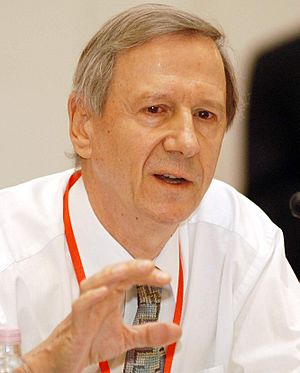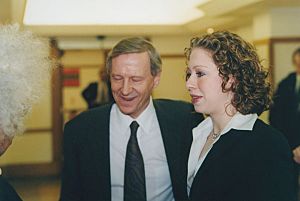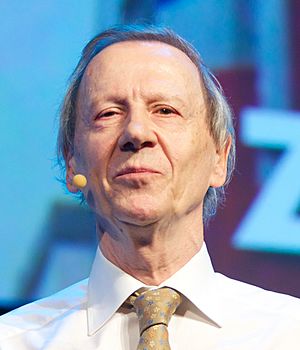Anthony Giddens facts for kids
Quick facts for kids
The Lord Giddens
MAE
|
|
|---|---|

Giddens in 2004
|
|
| Born |
Anthony Giddens
18 January 1938 London, England
|
| Other names | Tony Giddens |
| Title | Director of the London School of Economics (1996–2003) |
| Political party | Labour |
| Alma mater |
|
|
Notable work
|
|
| Scientific career | |
| Institutions | |
| Thesis | Sport and Society in Contemporary Britain (1961) |
| Academic advisors | David Lockwood |
| Doctoral students | Nigel Dodd |
| Influences | |
| Influenced |
|
Anthony Giddens, Baron Giddens (born 18 January 1938) is a famous English sociologist. A sociologist is someone who studies how people live and behave in groups. He is known for his ideas about how society and individuals shape each other. This is called the theory of structuration.
Giddens is seen as one of the most important modern sociologists. He has written at least 34 books that have been translated into many languages. In 2007, he was named the fifth most-referenced author in the humanities. This means many other experts read and write about his work.
Contents
Life and Career
Anthony Giddens was born in London, England, into a middle-class family. He was the first person in his family to go to a university. He studied sociology and psychology at the University of Hull. He later earned higher degrees from the London School of Economics and King's College, Cambridge.
Giddens taught at several universities, including the University of Cambridge. From 1997 to 2003, he was the Director of the London School of Economics, a very famous university.
He was also involved in politics. He supported the Labour Party in the United Kingdom and was an advisor to Prime Minister Tony Blair. In 2004, he was made a Baron, which is a title of nobility. This means he is a member of the House of Lords, a part of the British Parliament.
Main Ideas
Giddens has written about many topics in sociology. His work can be seen as a grand summary of many different ideas about society.
How Society and People Connect
One of Giddens's biggest ideas is the theory of structuration. This theory tries to answer a big question: Do we control our own lives, or does society control us?
Giddens said that both are true at the same time. He called this the duality of structure.
- Structure refers to the rules and resources of society. This includes things like laws, traditions, and language. These rules can limit what we do. For example, grammar rules limit how we can form sentences.
- Agency is our ability to make our own choices and act freely.
Giddens argued that structure and agency can't be separated. People's actions create and change the structures of society. At the same time, those structures make our actions possible. For example, the rules of a language (structure) allow us to create new sentences and communicate (agency).
Think of it like a game. The rules of the game (structure) tell you what you can and can't do. But within those rules, you (the agent) can make your own moves and create your own strategy.
Modern Life
Giddens was very interested in modernity, which is the world we live in today. He said that life in modern societies is very different from life in traditional ones.
In traditional societies, people's lives were often planned out for them by customs and family. In modern societies, we have many more choices about who we want to be and how we want to live. This can be freeing, but it can also be stressful.
Giddens also talked about globalization. This is the idea that the world is becoming more connected through technology, trade, and culture. What happens in one part of the world can now affect people everywhere. This creates new opportunities but also new risks, like global financial crises or climate change.
Politics and the 'Third Way'
Giddens believed that old political ideas of "left-wing" and "right-wing" were becoming outdated. He helped develop an idea called the Third Way. This was a political path that tried to combine the best ideas from different viewpoints.
The Third Way suggests that governments should not try to control everything, but they also shouldn't leave everything up to private companies. Instead, it focuses on creating opportunities for people, protecting the environment, and helping citizens navigate a rapidly changing world. This idea was very influential for leaders like Tony Blair in the UK.
Recent Work
In recent years, Giddens has focused on some of the biggest challenges facing the world today.
Climate Change
Giddens wrote a book called The Politics of Climate Change. He argued that climate change is a huge threat to our way of life. He wondered why governments were not doing more to stop it.
He described a problem he called Giddens's paradox. This means that people might not take climate change seriously until major disasters happen. But by then, it will be too late to fix the problem.
The Digital Revolution

Giddens has also written about the Digital Revolution. This includes the internet, robotics, and supercomputers. He says these technologies are changing the world faster than ever before.
These changes bring many benefits, like new ways to communicate and advances in medicine. But they also create new risks. For example, he has written about the use of artificial intelligence (AI) in military drones and the power of large technology companies. He believes we need to create rules to make sure AI is used for the good of everyone.
Honours and Awards
Giddens has received many awards for his work.
- In 2002, he won the Prince of Asturias Award for Social Sciences, which is sometimes called the "Spanish Nobel Prize."
- He has been given over 15 honorary degrees from universities around the world.
- He is a member of important academic groups, like the American Academy of Arts and Sciences.
See also
 In Spanish: Anthony Giddens para niños
In Spanish: Anthony Giddens para niños
 | Dorothy Vaughan |
 | Charles Henry Turner |
 | Hildrus Poindexter |
 | Henry Cecil McBay |


